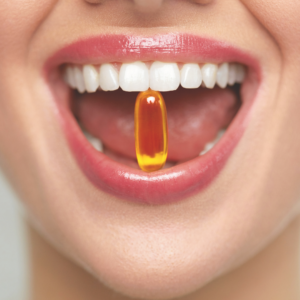
Periodontal disease and its early stage-gum disease is a destructive oral health condition that affects the gums and supporting bone around the teeth. It is caused by a bacterial infection and can lead to gum and bone recession, and even tooth loss if left untreated. While the primary cause of periodontal disease is related to other factors, recent research has also highlighted the role of vitamin D in its development and progression.
Vitamin D is a fat-soluble and is essential for calcium metabolism and bone’s health.
Deficiency of vit D puts children at risk of rickets, conditions in which bone does not mature, which cause skeletal deformities and osteoporosis in adults, bone density is reduced, which increased bone fracture. It is estimated that approximately 1 billion people worldwide have vitamin D deficiency, including people living in sunny California.
Vit D is essential for oral health as well. It is responsible for calcium absorption, which is necessary for strong teeth and optimal bone health. Additionally, vitamin D has been found to possess anti-inflammatory properties.
Several studies have examined the relationship between periodontal disease and vitamin D levels. They found that low levels of vitamin D increase the severity of periodontal disease and creates poor treatment response compared to those with sufficient levels.
Other studies published in the Journal of Clinical Periodontology discovered that vitamin D supplementation led to a reduction in gum inflammation and improved periodontal health. By regulating the excessive immune response, the tissue damage in the gums is significantly reduced.
Additionally, vitamin D may enhance the body’s ability to fight off bacterial infections, including the bacteria responsible for periodontal disease.
Maintaining adequate levels of vitamin D is important for overall health, including oral health. While sunlight exposure is a natural source of vitamin D, it can also be obtained through diet or supplements. Foods rich in vitamin D include fatty fish (such as salmon and mackerel), fortified dairy products, egg yolks, and mushrooms.
If you are concerned about your periodontal health or suspect you may have periodontal disease, it is essential to consult with a dental professional. They can evaluate your oral health, provide appropriate treatment if necessary, and offer guidance on maintaining optimal oral hygiene practices.
In conclusion, while maintaining good oral hygiene practices remains the primary way to prevent and manage periodontal disease, emerging research suggests that vitamin D may play a role in its development and progression. Adequate levels of vitamin D, whether obtained through sunlight exposure, diet, or supplements, helps support optimal oral health.


